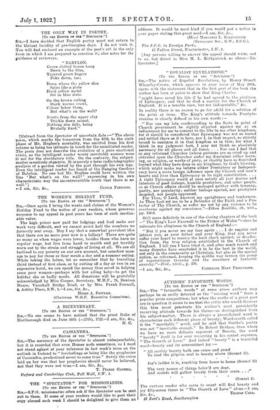" ROYALIST REVELATIONS."
[To THE EDITOR OF THE " SPECTATOR."] SIR,—The notice of Royalist Revelations, by Henry Stuart Wheatley-Crowe, which appears in your issue of May 20th, opens with the statement that in the first part of the book the author has been at pains to show that King Charles
"might have saved his life if he bad agreed to the abolition of Episcopacy, and that he died a martyr for the Church of England. It is a tenable view, but not indisputable," &e.
In reality there is no reason to go far afield for a solution of the point at issue. The King's attitude towards Presbyte- rianism is clearly defined in his own words :—
." Nor can my late condescending to the Scots in point of Church government be rightly objected against me as an inducement for me to consent to the like in my other kingdoms, for it should be considered that Episcopacy was not so rooted and settled there as it is here, nor I, in that respect, so strictly bound to continue it in that kingdom as in this; for what I think in my judgment best, I may not think so absolutely necessary for all places and all times.. . . Nor can I find that in any reformed Churches (whose patterns are so cried up and obtruded upon the Churches under my dominion) either learn- ing, or religion, or works of piety, or charity have so flourished beyond what they have done in my kingdoms, by God's blessing, which might make me believe either Presbytery or Independ- ency have a more benign influence upon the Church and men's hearts and lives than Episcopacy in its right constitution. . . . A right Episcopacy would at once satisfy all just desires and interests of good bishops, humble presbyters, and sober people, so as Church affairs should be managed neither with tyranny, parity, nor popularity; neither bishops ejected, nor presbyters despised, nor people oppressed.
For Thou, 0 Lord, knowest my uprightness and tenderness. As Thou hest set me to be a Defender of the Faith and a Pro- tector of Thy Church, so suffer me not by any violence to be overborne against my conscience."—Eikon Barilike, ch. xvii., pp. 156-8.
Still more definitely in one of the closing chapters of the book — " The King's Last Farewell to the Prince of Wales "—does he reiterate his allegiance to the Church of England :-
" But if you never see my face again .. . I do require and intreat you, as your father and your King, that you never suffer your heart to receive the least check against, or disaffec- tion from the true religion established in the Church of England. I tell you I have tried it, and after much search and many disputes have concluded it to be the best in the world, not only in the community as Christian, but also in the special notion, as reformed, keeping the middle way betwen the pomp of superstitious tyranny and the meanness of fantastic anarchy."—Ibid., xxvii., p. 236.










































 Previous page
Previous page